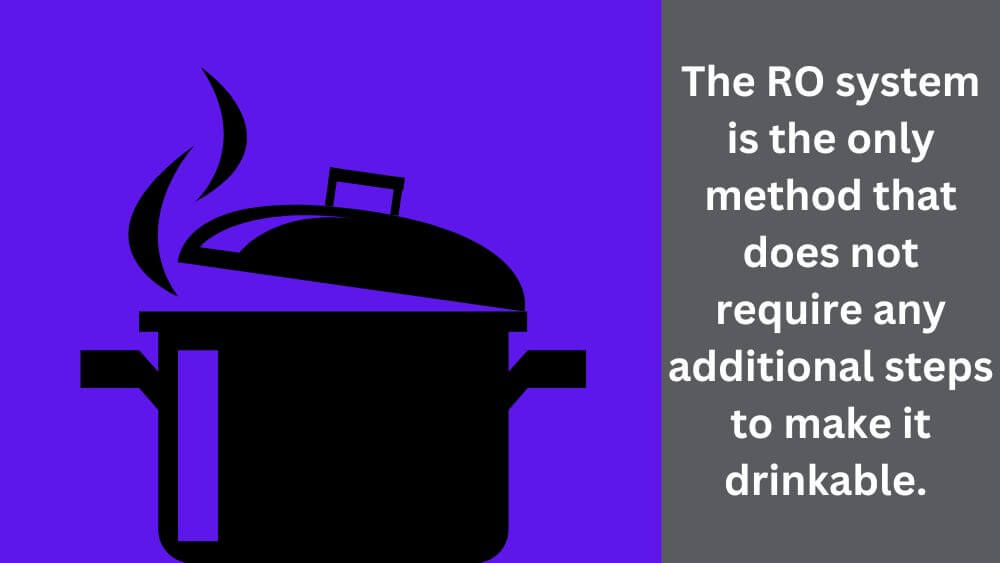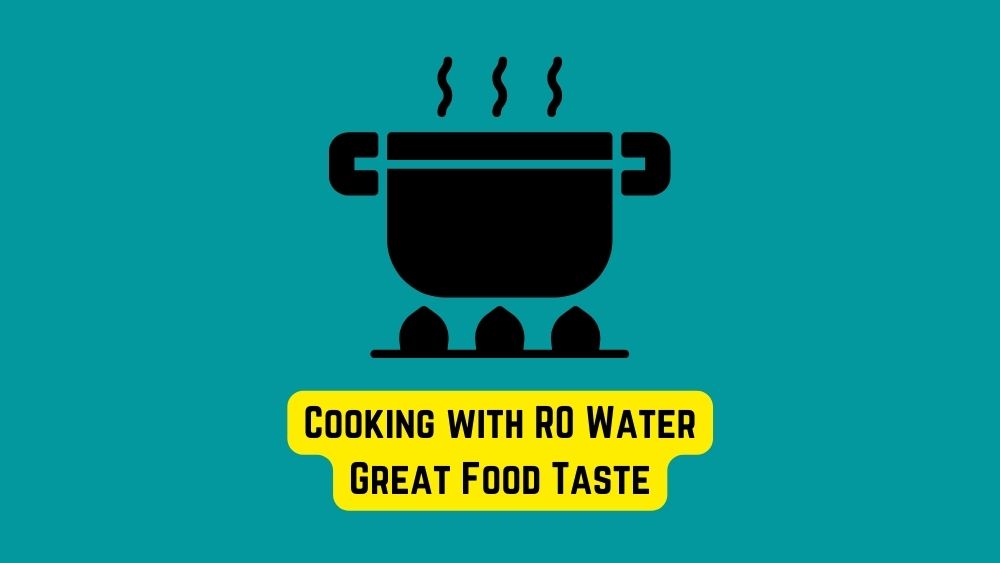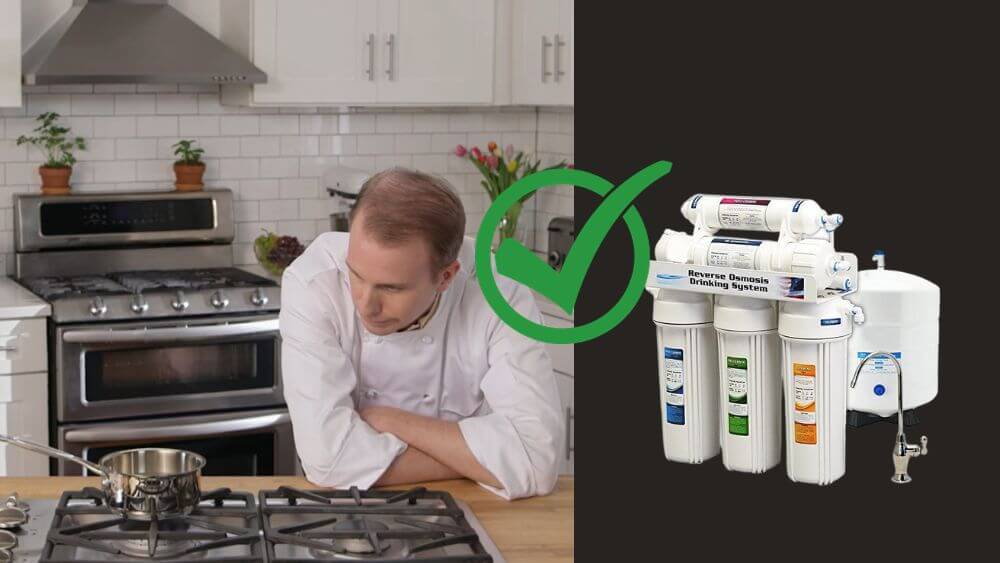Cooking with RO water is a great way to ensure your food is free of contaminants. RO water also removes unwanted flavors from your food, which can be especially important when cooking with strong-tasting ingredients like garlic or onion. People who use RO water for cooking will definitely recommend using RO water because RO water increases food taste significantly.
RO water stands for reverse osmosis water. It’s filtered using a unique process that removes impurities and minerals from tap water. This can make it taste “flat” or “lifeless” compared to regular tap water. This lack of flavor means RO water is excellent for cooking because it won’t alter the taste of your food.
Boiling Tap Water is Not Safe
Most people use tap water for cooking. But this is extremely harmful to human health. People have much more concerned about drinking water but less concerned about cooking water. Logically, to become healthier, you have to use safe water for both drinking and cooking.
As we know, tap water is not safe for drinking and cooking. Tap water contains harmful impurities and contaminants. It is not possible to remove most of the contaminants by boiling water. Yes, boiled water can kill harmful microorganisms, But it can not remove heavy metals like arsenic, lead, iron, etc.
Benefits of Cooking with RO water
There are several benefits of cooking with Reverse Osmosis water. The most important thing is reverse osmosis water is entirely safe from contaminants and harmful microorganisms. That is why you should use RO water for both drinking and cooking.
RO Water is The Safest Solution
RO water is the safest solution for drinking and cooking. If you drink RO water but do not use it in cooking, you are not safe from waterborne diseases.
RO Water Improves the Food Taste
Yes! RO water indeed improves the food taste. You may wonder how it is possible. RO water has low TDS (Total Dissolved Solids), which means RO water does not contain many minerals of water. As a result, the Taste of food increases significantly. You can try cooking rice with RO water and feel the difference.
Balance of Minerals
We all know that food is our body’s primary source of minerals. Also, RO water indeed has fewer minerals. But, if we cook with RO water, food gets enough minerals. As a result, the balance of minerals remains good.

Do I Need to Boil Reverse Osmosis Water?
Reverse osmosis is a process that filters water through a semipermeable membrane. The procedure removes impurities from the water by forcing them through the tiny pores in the membrane. One of the most common questions we get asked is whether or not reverse osmosis water needs to be boiled before drinking.
The simple answer is no. You do not need to boil RO water. Let’s assume your water has no contaminants, heavy metals, or bacteria. Then you no need to boil the water. Yes! The RO system is the only method that does not require any additional steps to make it drinkable.
However, a few things to remember if you use RO water for drinking water. If your RO system does not have a storage tank and you are drawing water directly from the RO filter, we recommend you flush the first couple of gallons of filtered water down the drain before using it for drinking.
Can We Use Ro Waste Water for Cooking?
One of the most frequently asked questions at our website is whether or not RO waste water is safe for cooking. The simple answer is no. You can not use RO waste water for cooking. However, there are some other options for using waste RO water.
RO waste water is not safe from contaminants. In fact, only the contaminants water filter out from the reverse osmosis system. That is why you should not use RO wastewater for cooking.
You may ask when we cook, the water automatically boils, then what’s the problem? The problem is that boiled water is not safe. Boiled water can not remove heavy metals from water. It can only kill bacteria. Except for drinking and cooking, you can use RO water for pet water, gardening, cleaning dishes, floors, etc.

Is Ro Better Than Boiling Water?
There is a common misconception that boiling water is the best way to purify it, but this isn’t necessarily true. While boiling water will kill most bacteria and viruses, it won’t remove all the contaminants found in water. This is where reverse osmosis comes in.
Reverse osmosis is a process that forces water through a semipermeable membrane, which only allows clean water molecules to pass through and traps impurities on the other side. This results in clean, purified water that is free of contaminants like lead, chlorine, and fluoride. So, reverse osmosis is the way to go if you’re looking for the best way to purify your water.
Not only does it remove more contaminants than boiling alone, but it also leaves you with clean, great-tasting water that’s ready to drink.
Can You Drink Reverse Osmosis Water During a Boil Order?
The answer is yes. No matter if your area is under a boil order. A reverse Osmosis system is the most effective method of purifying water. So you can drink RO water anytime, anywhere, with confidence.
You can drink RO water during a boil order if you follow specific guidelines. First, it’s essential to understand what a boil order is and why it’s necessary.
A boil order is issued when there is a municipal water supply problem that could contaminate it with bacteria or other harmful organisms. Boiling the water kills these contaminants and makes it safe to drink.
When a boil order is in effect, you should only use RO water filtered through a different filtration system, such as a carbon filter or ultraviolet light sterilizer. These filters will remove any remaining bacteria or contaminants from the water.
Final Words
Since RO water does not contain chlorine or other chemicals that can alter the taste of your food, it enhances the flavor. RO water not only improves food quality but also ensures safe cooking. To keep safe from waterborne diseases, it is a must to use RO water for cooking.

Hasan Al Sarker is a Reverse Osmosis Specialist. He has worked for many years to ensure safe drinking water for all. His research paper has been published in several journals, including Issue, Medium, and Slideshare. He is recognized as a water doctor among specialists though he did not attend medical college.
Besides working as a researcher of reverse osmosis technology, he is also very fancy with the kitchen and cooking. His guides are reading thousands of people every day. As a head of content, he is responsible for all the published articles at RO System Reviews.

